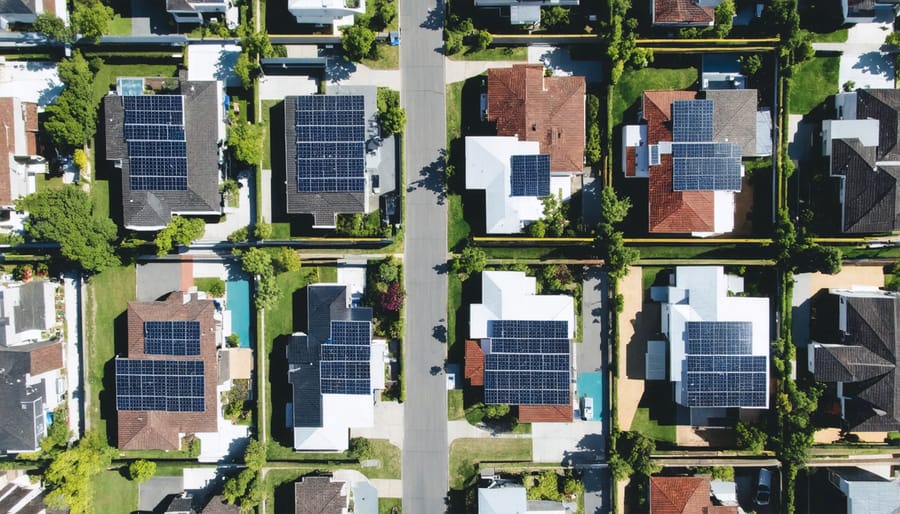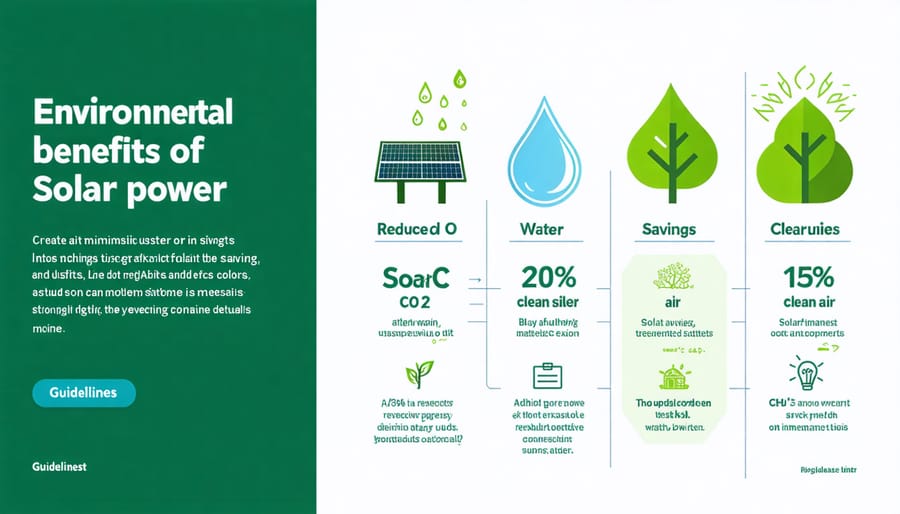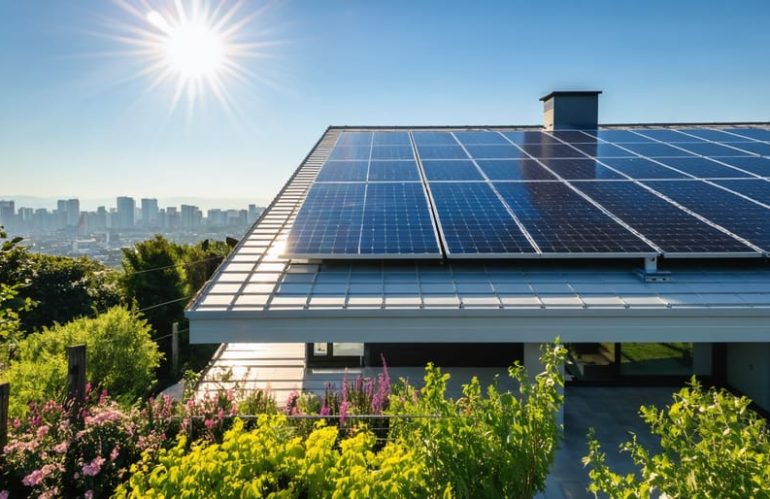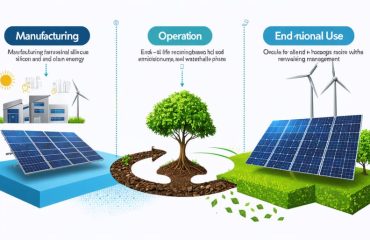Solar energy stands as one of humanity’s most powerful tools in the fight against climate change, offering a clean alternative that transforms how we power our homes and communities. The environmental impact of solar power extends far beyond simple carbon reduction, creating a ripple effect of positive change across our ecosystem. Every solar panel installed represents approximately 20 metric tons of carbon emissions prevented over its lifetime – equivalent to planting 500 trees. This renewable energy revolution not only eliminates harmful greenhouse gases but also reduces water pollution, minimizes land degradation from fossil fuel extraction, and creates sustainable jobs in clean energy sectors. For homeowners considering solar installation, this means each panel becomes a personal contribution to environmental preservation, offering a tangible way to protect our planet while securing energy independence for future generations.
Shrinking Your Carbon Footprint with Solar Power

Your Solar Home’s CO2 Impact
Installing solar panels on your home can make a surprisingly large dent in your carbon footprint. The average residential solar system, typically sized at 6kW, prevents about 5-6 metric tons of carbon dioxide emissions annually – equivalent to taking 1.2 cars off the road. To put this in perspective, it’s like planting 100 trees every year.
In states with coal-heavy power grids like West Virginia or Kentucky, your solar impact is even greater. A typical solar home in these regions can offset up to 8 metric tons of CO2 annually. Even in states with cleaner energy mixes, like California, residential solar systems prevent approximately 3-4 metric tons of emissions each year.
Over a 25-year lifespan, your solar installation could prevent more than 125 metric tons of CO2 from entering the atmosphere. That’s comparable to saving 14,000 gallons of gasoline or preserving 146 acres of forest. When combined with your neighbors’ solar installations, these individual contributions create meaningful environmental change at the community level, helping combat climate change one roof at a time.
Beyond Electric Bills: Your Environmental Legacy
When you choose solar energy, you’re creating an environmental legacy that extends far beyond lower electricity bills. Each solar panel installation contributes to a cleaner, more sustainable future by significantly reducing carbon emissions. Over its lifetime, a typical residential solar system can prevent the equivalent of planting 100-150 trees worth of CO2 from entering the atmosphere.
The true sustainability of solar panels becomes even more apparent when considering their lasting impact on air and water quality. By reducing reliance on fossil fuels, your solar installation helps decrease air pollutants that contribute to respiratory issues and acid rain. A single home’s solar system can offset approximately 100,000 pounds of carbon dioxide in its lifetime – equivalent to taking 20 cars off the road for a year.
Your decision to go solar also helps preserve natural resources for future generations. By generating clean energy from sunshine, you’re reducing the need for water-intensive cooling processes used in traditional power plants and helping protect wildlife habitats from the effects of resource extraction. This ripple effect means your environmental impact grows stronger with each passing year, creating a lasting legacy of positive change for your community and the planet.
Protecting Local Ecosystems

Clean Air, Happy Communities
When you choose solar energy, you’re not just powering your home – you’re helping your entire community breathe easier. Solar panels generate electricity without releasing harmful pollutants like nitrogen oxides, sulfur dioxide, and particulate matter that typically come from burning fossil fuels. This direct reduction in air pollution has immediate benefits for local air quality and public health.
In urban areas, where air pollution often poses serious health risks, the switch to solar energy can make a significant difference. Studies show that neighborhoods with higher solar adoption rates experience measurable improvements in air quality. For every megawatt of solar power installed, approximately 1,500 pounds of nitrogen oxides and 3,000 pounds of sulfur dioxide emissions are avoided annually.
The benefits extend beyond cleaner air – reduced fossil fuel emissions mean fewer respiratory problems, decreased healthcare costs, and improved quality of life for community members. Children, elderly residents, and those with respiratory conditions particularly benefit from these improvements. By choosing solar power, you’re contributing to a healthier, more sustainable environment for everyone in your neighborhood.
Water Conservation Benefits
Solar energy doesn’t just harness the sun’s power – it also plays a crucial role in preserving our precious water resources. Unlike traditional power plants that require massive amounts of water for cooling and steam generation, solar panels operate without using any water in their electricity production process. A typical coal or nuclear power plant consumes between 20,000 to 60,000 gallons of water per megawatt-hour of electricity generated. In contrast, solar panels need only occasional cleaning to maintain optimal performance.
By switching to solar power, you’re helping reduce the strain on local water supplies. Over a year, a typical home solar system can save approximately 16,000 gallons of water that would otherwise be used in conventional power generation. This water conservation benefit becomes even more significant in drought-prone areas where water resources are already scarce.
Moreover, solar energy helps protect water quality by eliminating the risk of thermal pollution from cooling towers and reducing the need for water-intensive mining operations associated with fossil fuels. This means cleaner rivers, lakes, and groundwater for future generations.
Creating a Sustainable Future
Your Role in the Green Energy Movement
By choosing solar energy for your home, you become part of a growing movement that’s reshaping our energy future. Every solar panel installation contributes to reducing greenhouse gas emissions and decreasing our collective carbon footprint. When you go solar, you’re not just making a personal choice – you’re joining millions of homeowners who are actively fighting climate change.
Your decision creates a ripple effect in your community. Neighbors who see your solar panels are more likely to consider renewable energy themselves, creating a positive chain reaction. This “solar contagion” effect has been documented in numerous studies, showing how individual choices can transform entire neighborhoods.
Moreover, your commitment to clean energy supports the entire renewable energy ecosystem, from manufacturing to solar panel recycling. By participating in the solar revolution, you’re helping create demand for greener technologies and supporting jobs in the renewable energy sector. Your role, combined with others, drives the innovation and scale needed to make solar energy increasingly accessible and affordable for everyone.

Setting an Example for Future Generations
Installing solar panels does more than reduce your carbon footprint – it creates a lasting educational impact on future generations. Children who grow up in homes powered by solar energy develop a natural understanding of renewable resources and environmental stewardship. They witness firsthand how technology can work in harmony with nature, fostering an innate appreciation for sustainable living.
Your solar installation becomes a conversation starter in the neighborhood, inspiring others to explore clean energy options. Many schools use nearby solar homes as real-world examples in their science and environmental curricula, turning your investment into a valuable teaching tool. Parents report that their children become more environmentally conscious and often become advocates for sustainable practices in their schools and communities.
By choosing solar power today, you’re helping shape a generation that views renewable energy not as an alternative, but as the standard for powering our world.
Solar energy stands as a powerful solution in our collective effort to protect the environment. By harnessing the sun’s natural power, we can significantly reduce greenhouse gas emissions, conserve precious water resources, and minimize our dependence on fossil fuels. A single residential solar installation can prevent up to 4 tons of carbon emissions annually – equivalent to planting over 100 trees.
The environmental benefits of solar energy extend far beyond individual households. As more homeowners embrace solar power, we create a ripple effect that strengthens our commitment to a cleaner, more sustainable future. From improved air quality to reduced water pollution and decreased land degradation from mining, solar energy helps preserve our natural resources for future generations.
Now is the perfect time to join the solar revolution. With advanced technology, decreasing installation costs, and numerous incentives available, transitioning to solar power has never been more accessible. By choosing solar energy for your home, you’re not just making a smart financial decision – you’re taking a meaningful step toward environmental stewardship.
Consider making the switch to solar power today. Your decision can help create a healthier planet while inspiring others in your community to embrace clean, renewable energy. Together, we can build a more sustainable future, one solar panel at a time.









